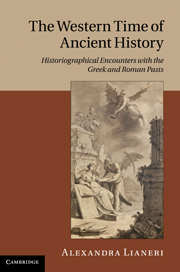Book contents
- Frontmatter
- Contents
- Acknowledgements
- Notes on contributors
- INTRODUCTION
- THEORISING WESTERN TIME: CONCEPTS AND MODELS
- ANCIENT HISTORY AND MODERN TEMPORALITIES
- UNFOUNDING TIME IN AND THROUGH ANCIENT HISTORICAL THOUGHT
- 10 Thucydides and social change: Between akribeia and universality
- 11 Historia magistra vitae in Herodotus and Thucydides? The exemplary use of the past and ancient and modern temporalities
- 12 Repetition and exemplarity in historical thought: Ancient Rome and the ghosts of modernity
- 13 Time and authority in the Chronicle of Sulpicius Severus
- AFTERWORD
- Bibliography
- Index
12 - Repetition and exemplarity in historical thought: Ancient Rome and the ghosts of modernity
from UNFOUNDING TIME IN AND THROUGH ANCIENT HISTORICAL THOUGHT
Published online by Cambridge University Press: 03 May 2011
- Frontmatter
- Contents
- Acknowledgements
- Notes on contributors
- INTRODUCTION
- THEORISING WESTERN TIME: CONCEPTS AND MODELS
- ANCIENT HISTORY AND MODERN TEMPORALITIES
- UNFOUNDING TIME IN AND THROUGH ANCIENT HISTORICAL THOUGHT
- 10 Thucydides and social change: Between akribeia and universality
- 11 Historia magistra vitae in Herodotus and Thucydides? The exemplary use of the past and ancient and modern temporalities
- 12 Repetition and exemplarity in historical thought: Ancient Rome and the ghosts of modernity
- 13 Time and authority in the Chronicle of Sulpicius Severus
- AFTERWORD
- Bibliography
- Index
Summary
Inheritance is never a given, it is always a task.
Jacques Derrida, Specters of MarxIn this chapter I explore some of the various ways in which modernity configures repetition as an improper relation to the past. This exploration mediates the wider question of what modernity wants to do with the past, whether it is to break with it, to sublimate it, or to form a new kind of relation altogether. This leads us to consider the tropes of repetition and of exemplarity as the grounds for an engagement with the past. That is to say, modernity does not merely employ these tropes in configuring a relation with the past; rather modernity's relation with the past is marked by the difference between ancient and modern uses of these tropes. Therefore, in the middle section of this chapter I turn to the theory and practice of exemplary thinking in ancient Rome, as a mode of thinking which infuses the present with the complex temporalities of subjective pasts and futures. Framing this discussion is a consideration of some ways in which Marx, in particular, characterised repetition and engaged with exemplarity in his attempt to create a new modernity.
In the Eighteenth Brumaire Marx presented, in the form of a political commentary on the revolutionary events in France between 1848 and 1851, a historical meditation on what it was to be modern, differentiating nineteenth-century forms of repetition – and of revolution – from what had gone before.
- Type
- Chapter
- Information
- The Western Time of Ancient HistoryHistoriographical Encounters with the Greek and Roman Pasts, pp. 264 - 279Publisher: Cambridge University PressPrint publication year: 2011
- 3
- Cited by

